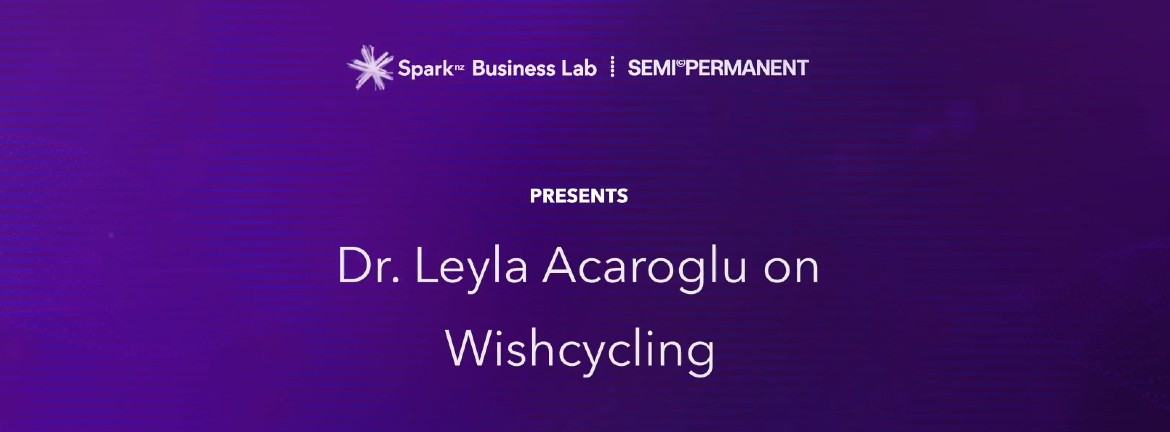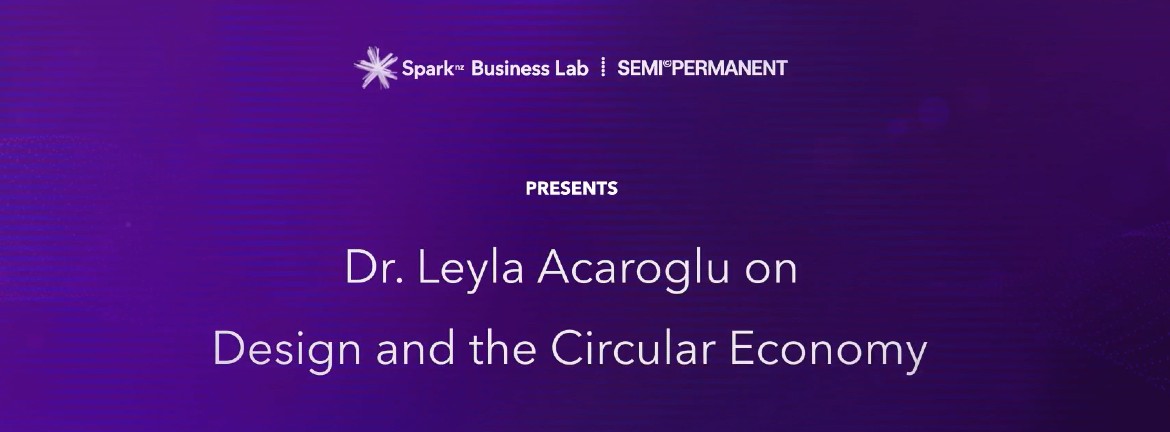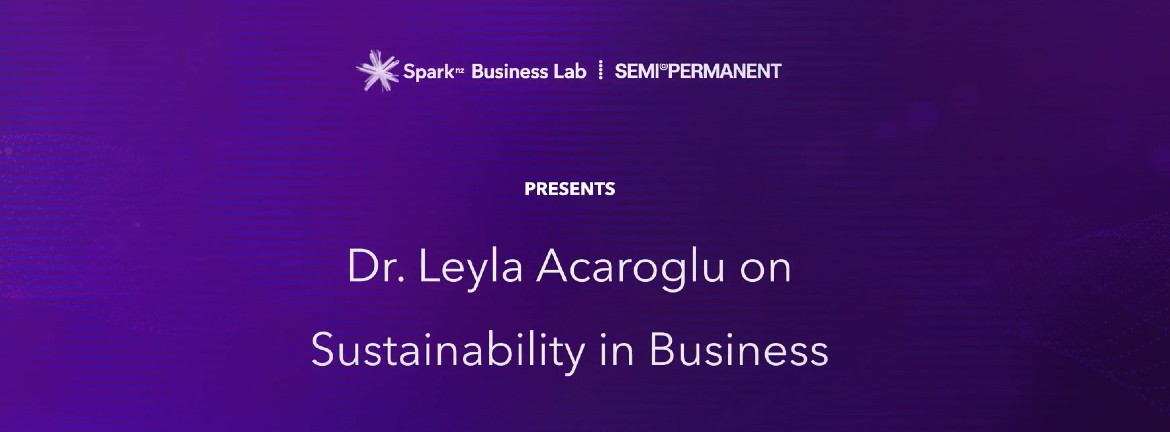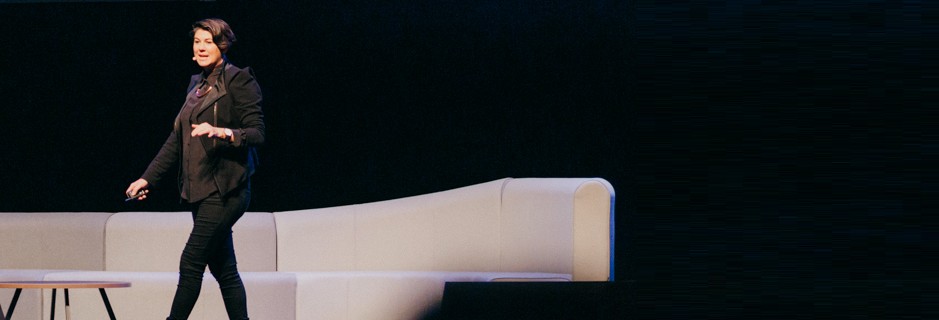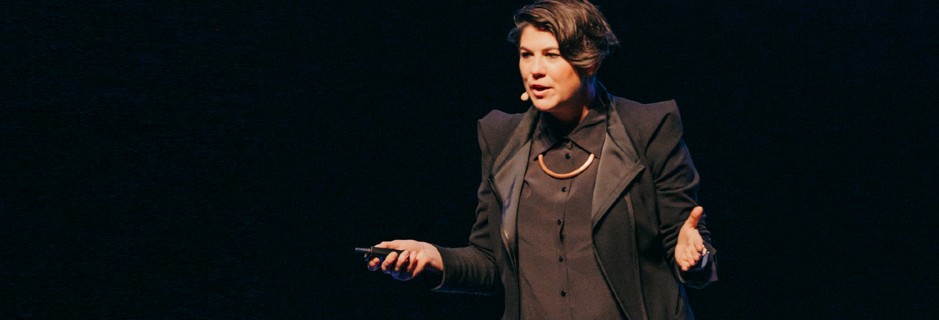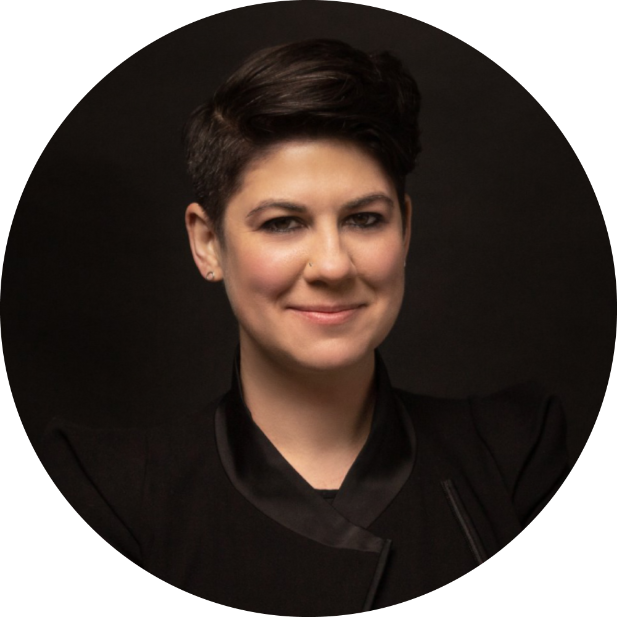
Dr. Leyla Acaroglu
The Unschool & Disrupt Design
We have a waste crisis
Be honest, do you know if the items you throw away are recyclable or not?
Do you sometimes put things in the recycling hoping they'll be recycled anyway?
If you can relate to the above, you're not alone. Dr. Leyla Acaroglu has over 20 years of experience in this field and admits to doing it as well.
This concept is known as wishcycling. “It’s when you wish that the thing you’re holding in your hand is recyclable. And so you put it in the recycling hoping it’s going to be converted into something usable, probably knowing full well that it’s not going to be recycled,” says Leyla.
Sadly, our good intentions can cause more harm than good by disrupting the recycling industry and wasting valuable time and resources. Don't feel guilty - it's not entirely your fault.
The real culprits are the many disposable materials flooding our markets and the systems that can't keep up with our consumption habits.
So, what's the solution? Leyla recommends implementing the concept of extended producer responsibility. This is where companies take responsibility for the entire lifespan of their products.
The Waste Electronic and Electrical Equipment Directive (WEEE Directive) is an EU policy that aims to reduce electronic waste in landfills.
It promotes the reuse, recycling and recovery of electrical and electronic equipment, contributing to a circular economy.
The directive also requires producers to finance their products' collection, treatment and disposal in an environmentally sound manner. Discover the WEEE Directive
Wishcycling is more than just a bad habit; it's a symptom of a larger issue.
When you find yourself wishcycling, remember: it's not about guilt, but about acknowledging our role in a system that needs change.
And that change starts with us.
Circular service design: A game changer
If you're familiar with "reduce, reuse, recycle," you're already familiar with the circular economy. Now, these three rules have grown to seven, with "redesign" being one of the new actions.
Leyla says redesign is about “taking an existing product or service and redesigning it to fit within the circular economy - including its delivery, service and business model.”
Leyla believes that circular service design is a game changer. She recommends businesses engage circular service designers to help them map their service delivery model and find ways to meet customer needs with fewer resources.
Designing for the circular economy: Real-world examples
The redesign process is complex and there's no one-size-fits-all solution. This creates what Leyla describes as "a great innovation space."
Some companies are intentionally creating solutions to extend product life and give consumers more control over the goods and services they use.
iFixit
iFixit, sometimes called ‘The Free Repair Manual’, is an online company and community dedicated to helping people repair their devices.
They offer step-by-step DIY guides, sell specialised tools and parts and provide a troubleshooting forum for electronic repairs.
Their mission is to reduce electronic waste and promote sustainability by advocating for right-to-repair laws.
Group Renalte
Group Renalte runs Europe’s first circular economy vehicle factory. They aim to prolong vehicle and component lifespans while decreasing reliance on natural resources.
They achieve this through remanufacturing vehicle parts, increasing recycled plastic content, repurposing electric batteries and reducing waste.
Patagonia
Patagonia is well-known for its ‘Worn Wear’ programme, which encourages customers to return their used clothes for repair, resale or recycling.
This initiative reduces waste and extends garment lifespan, promoting sustainability and environmentally friendly fashion.
Again Again
Again Again is a New Zealand-based sustainable coffee cup lending system designed to combat waste.
Customers pay a small deposit to borrow a durable stainless steel cup and, upon return, receive their deposit back.
This initiative promotes environmental consciousness and offers a convenient and eco-friendly alternative to single-use cups.
Are you ready for the circular economy?
These examples provide valuable insights for New Zealand businesses looking to enhance their sustainability efforts.
Here are a few key takeaways:
The Sustainable Business Network
The Sustainable Business Network provides insights into the circular economy, offering seven circular strategies to help your business on its journey to go circular.
Check out The Sustainable Business NetworkThe Circular Design Guide
The Circular Design Guide has several free activities to help you understand, define, make and release circular innovations.
Check out The Circular Design GuideXLabs NZ
XLabs NZ is a circular design programme that facilitates practical, interactive and engaging learning experiences. They support businesses in their shift towards a circular future.
Discover XLabs NZCircularity
Circularity is a dedicated New Zealand circular economy agency. They're here to support you in your circular design and strategy for a more resilient and regenerative future.
Discover CircularityData and Tech in Sustainability
Navigating sustainability in business requires robust data and asset management. As Leyla puts it, "if you can't measure it, you can't claim it."
Tools such as Environmental Impact Assessments, Social Impact Assessments and Lifecycle Assessments measure an organisation’s financial, social and environmental health.
Leyla emphasises using technology for data and asset management to boost operational efficiency beyond financial performance.
Luckily, there are already innovative tech platforms creating these tech solutions.
PlanA
Plan A uses tech to help businesses not only manage and measure their environmental impact but also develop actionable strategies to improve it.
The platform uses data and analytics to track environmental performance in real-time throughout the supply chain. It identifies opportunities for reducing the carbon footprint and enhancing sustainability in operations.
Greenly
Greenly helps businesses measure and reduce their carbon footprint. It analyses banking transactions to calculate real-time carbon emissions.
Greenly provides data on a company's environmental impact and actionable insights on how to reduce it.
The platform's algorithm aligns with the Greenhouse Gas Protocol standards for reliable and accurate results.
EMF: Environmental Management Framework
EMF is a software solution developed by the New Zealand company IsoMetrix.
It helps businesses manage their environmental impact by providing real-time monitoring of environmental performance across their entire supply chain.
This tool also allows businesses to track their KPIs and identify areas for improvement.
Discover the Environmental Management Framework
The only caveat Leyla has about tech solutions is, "Everything we do on the Internet has a physical footprint through the service and the energy use".
The industry is making efforts to minimise the carbon impact of digital transformation by adopting techniques like "green coding" to develop lighter systems.
For instance, Ethereum's blockchain cryptocurrency reduced its carbon impact by 97% through code changes.
The Sustainability Journey: What your business should consider
"Sustainability is not about taking things away. It's about building better, newer, faster, more improved and hopefully future positive outcomes," Leyla encourages.
Here are some steps for New Zealand businesses to consider on their sustainability journey:
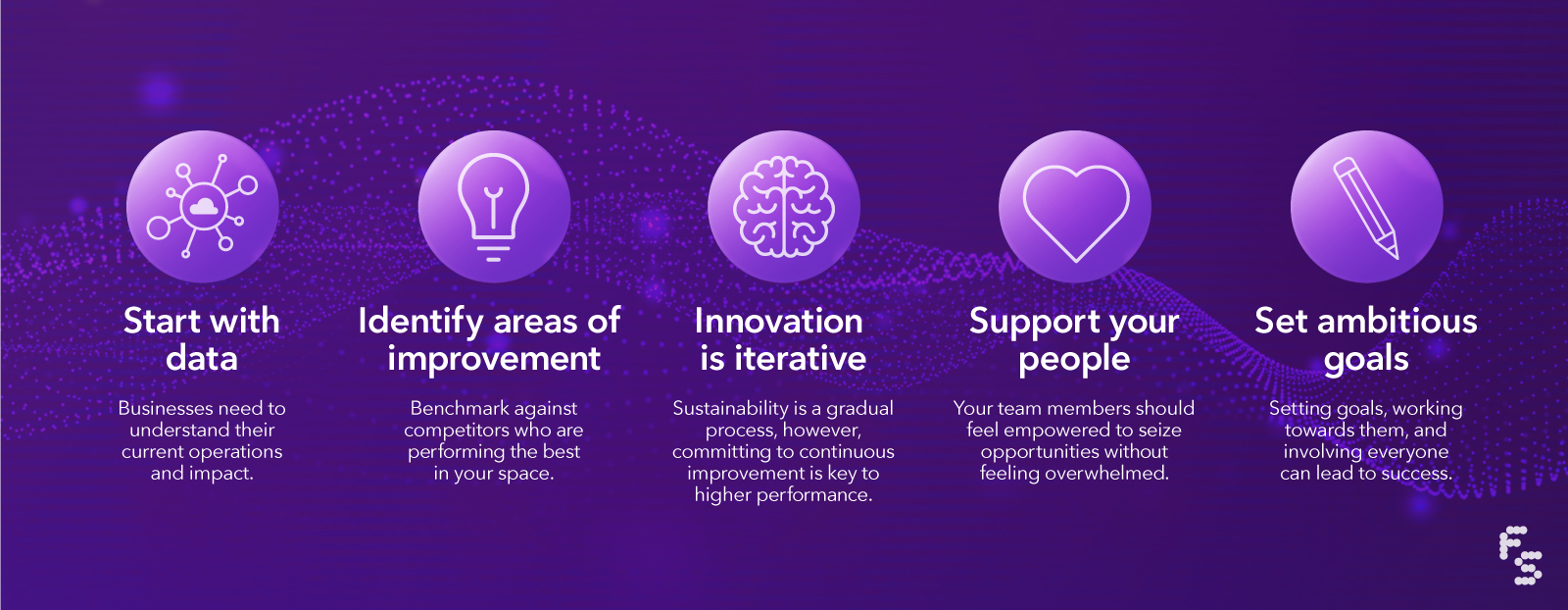
1. Start with data
The first thing businesses need to do is conduct Environmental Impact Assessments, Social Impact Assessments, and Lifecycle Assessments to understand their current operations and impact
2. Identify areas of improvement
Benchmark against local and international competitors who are performing the best in your space.
What are they doing? How can you learn from that? Businesses can then develop policies and processes for improvement.
3. Innovation is iterative
Sustainability is a gradual process. It involves assessment, consideration, transformation, reassessment and, inevitably, some mistakes.
However, committing to continuous improvement is key to higher performance.
4. Support your people
It's important to address the skills gap within your organisation.
Every team member within your business should have basic knowledge and feel empowered to seize opportunities without feeling overwhelmed.
Collaborative learning and best practices, like Environmental Impact Assessments, can help get you started.
5. Set ambitious goals
Like IKEA's commitment to being fully circular by 2030, you should set ambitious sustainability goals.
Setting goals, working towards them and involving everyone can lead to unexpected success.
As Leyla says, "There’s only wins if done well and doing well is about being open, transparent and committed to continual learning."
More articles to spark your interest
Developing sustainable cities
Creating sustainable cities requires addressing various aspects. When we step back and look at the big picture, there are specific areas where we can take action to make a positive impact.
Read moreDisruptive design method
The Disruptive Design Method, developed by Dr. Leyla Acaroglu, prompts businesses to view problems as part of a larger system, rather than in isolation.
Read more
